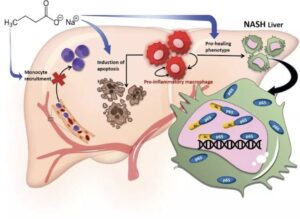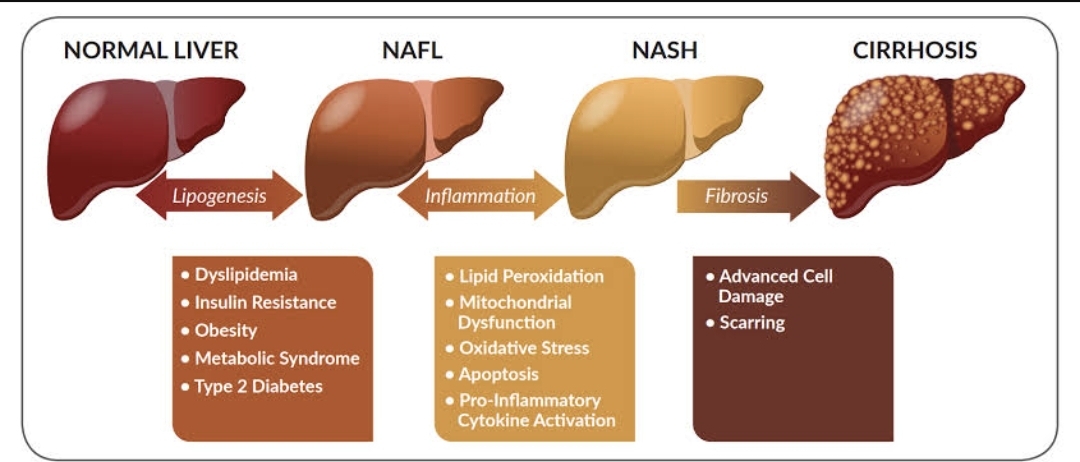Non-alcoholic steatohepatitis (NASH) is a liver condition with serious health implications. Dr. Vipul Agarwal breaks down the symptoms, causes, and treatment options.
By Dr. Vipul Agarwal
Non-alcoholic fatty liver disease (NAFLD), a condition characterized by fat accumulation in the liver, affects many people globally. There are two main types of NAFLD: non-alcoholic fatty liver (NAFL), where the liver has fat buildup without inflammation, and non-alcoholic steatohepatitis (NASH), where the liver is inflamed. NASH is particularly concerning as it can lead to severe complications like cirrhosis. Risk factors include obesity, diabetes, and high cholesterol. Diagnosis often involves blood tests and imaging, with treatment focusing on managing associated conditions. Regular follow-ups with a doctor are crucial for monitoring and managing this condition.
Overview
Non-alcoholic fatty liver disease (sometimes called “NAFLD”) is a condition in which fat builds up in the liver. The liver is a big organ in the upper right side of the belly.
There are 2 types of NAFLD:
- Non-alcoholic fatty liver (also called “NAFL”) – In NAFL, the liver has fat build-up, but is not
- Non-alcoholic steatohepatitis (also called “NASH”) – In NASH, the liver has fat build-up and is
This article is mostly about NASH, because that is the condition that can lead to the most problems.
People who drink too much alcohol can get
What causes NASH?
Risk factors for NASH are
- Obesity
- Diabetes
- high cholesterol
- certain medicines
What are the symptoms of NASH?
Most people with NASH have no symptoms.
Your doctor might suspect that you have NASH from the results of your routine blood tests.
Do I need more tests?
Yes. If your doctor suspects that you have NASH, you will likely have:
- More blood tests
- An imaging test of the liver, such as an ultrasound, CT, or MRI scan – Imaging tests create pictures of the inside of the body.
Some people need a liver biopsy. During this test, a doctor removes a small sample of tissue from the liver. Then, another doctor looks at the sample under a microscope to see if NASH is present. A liver biopsy is the only test that can tell for sure if you have NASH. Your doctor might do this test if they are not sure if you have NASH or to see how much inflammation there is in the liver. If your blood tests and imaging tests are normal, you will not need a liver biopsy.

How is NASH treated?
NASH is not typically treated directly. But the condition can get better when other medical conditions that often happen with NASH get treated. For example, losing weight, and controlling high blood sugar and cholesterol can help improve NASH.
With that in mind, your doctor can:
- Help you lose weight, if you are overweight – If your doctor recommends losing weight, they can help you make a plan to do this safely. It’s important not to lose weight too quickly. Do not lose more than 3.5 pounds (1.6 kilograms) a week.
- Treat your high blood sugar, if you have high blood sugar
- Treat your high cholesterol, if you have high cholesterol
Making these changes has benefits besides helping with NASH. These changes can also reduce your chances of having a heart attack or stroke. That’s important because people with NASH are often also at risk for heart disease and stroke.
If you take a medicine that could be causing NASH, your doctor will stop or change that medicine.
If you have a severe form of NASH but do not also have diabetes or heart disease, your doctor or nurse might suggest that you take Vitamin E. A few studies suggest that vitamin E can reduce some of the liver damage that occurs as part of NASH. But there are also studies that suggest that high doses of vitamin E increase the risk of death. So do not take vitamin E unless your doctor recommends it.
Does NASH get worse over time?
NASH might get worse over time. Sometimes, it leads to serious scarring of the liver, called “cirrhosis.” Cirrhosis can cause different symptoms, such as swelling in the legs, trouble breathing, or feeling tired. If you get cirrhosis, your doctor will talk with you about different possible treatments.
Do I need to follow up with my doctor?
Yes. People who have NASH need to see their doctor for regular check-ups. Your doctor will do follow-up tests regularly. These usually include blood tests.
The views expressed in this article are solely those of the author and do not necessarily reflect the opinions or views of this Magazine.
Dr. Vipul Agarwal M.B;B.S MD (Internal Medicine), FAGE, CPCDM (RSSDI)
Consultant physician & Diabetologist at Unique Healthcare Maitri Clinic Jaipur, Rajasthan, India
He can be reached at [email protected]

Leave a Reply